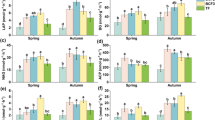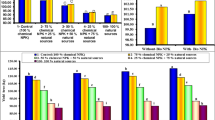Abstract
Experiments were carried out with citrus (Citrus reticulate) and tea (Podocarpus fleuryi Hickel.) to study the effects of compound fertilizers on their yields and quality. In the citrus experiment, application of compound fertilizers increased available P, K and Mg contents in soil but decreased alkali-hydrolyzable N contents in soil and N, P and K contents in leaves. In the tea experiment, application of compound fertilizers increased available P, K and Mg contents in soil and N, P, K and Mg contents in leaves but decreased alkali-hydrolyzable N in soil compared with the urea treatment. Application of compound fertilizers could improve the quality of citrus and tea, increase their yields and enhance their economical profits significantly. Compared with the control, application of compound fertilizers increased citrus yields by 6.31, 12.94 and 17.69 t/ha, and those of tea by 0.51, 0.86 and 1.30 t/ha, respectively. Correspondingly, profits were increased by 21.4% to 61.1% for citrus and by 10.0% to 15.7% for tea. Optimal rates of compound fertilizers were recommended for both crops.
Similar content being viewed by others
References
Bian, H.W., Wang, J.H., Lin, W.Q., Han, N., Zhu, M.Y., 2002. Accumulation of soluble sugars, heat-stable proteins and dehydrins in cryopreservation of protocorm-like bodies of Dendrobium candidum by the air-drying method. J. Plant Physiol., 159(10):1139–1145. [doi:10.1078/0176-1617-00824]
Chen, W.W., 1990. Studies of different ratio N, P and K on citrus. Fertilizer Industry, 2(2):9–15 (in Chinese).
Committee of Agrochem., Soil Sci. Soc. of China, 1983. Routine Analytic Methods of Soil and Agrochemistry. Science Press, Beijing, p.450–508 (in Chinese).
Deng, X.X., 1996. Report on the eighth international convocation of citrus. Fruits Science, 13(4):265 (in Chinese).
Fei, D.Y., Zhang, W.Y., 1991. Effects of Mg fertilizer on quality of tea. Tea Report, 13(2):15–18 (in Chinese).
Harris, J.R., 1996. Subcellular Biochemistry, Ascorbic Acid: Biochemistry and Biomedical Cell Biology. Plenum, New York, p.9780–9800.
Kato, M., Gyoten, Y., Sakai-Kato, K., Toyo’oka, T., 2003. Rapid analysis of amino acids in Japanese green tea by microchip electrophoresis using plastic microchip and fluorescence detection. Journal of Chromatography A, 1013(1–2):183–189. [doi:10.1016/S0021-9673(03)01037-9]
Lee, S.K., Kader, A.A., 2000. Preharvest and postharvest factors influencing vitamin C content of horticultural crops. Postharvest Biology and Technology, 20(3): 207–220. [doi:10.1016/S0925-5214(00)00133-2]
Li, C.J., Pan, G.S., 1991. Fertilization and nutrition analysis on tea plant. Tea, 17(6):17–21 (in Chinese).
Li, B.W., Andrews, K.W., Pehrsson, P.R., 2002. Individual sugars, soluble, and insoluble dietary fiber contents of 70 high consumption foods. Journal of Food Composition and Analysis, 15(6):715–723. [doi:10.1006/jfca.2002.1096]
Majchrzak, D., Mitter, S., Elmadfa, I., 2004. The effect of ascorbic acid on total antioxidant activity of black and green teas. Food Chemistry, 88(3):447–451. [doi:10.1016/j.foodchem.2004.01.058]
Morel, I., Lescoat, G., Cogrel, P., Sergent, O., Pasdeloup, N., Brissot, P., Cillard, P., Cillard, J., 1993. Antioxidant and iron-chelating activities of the flavonoids catechin, quercetin and diosmetin on iron-loaded rat hepatocyte cultures. Biochemical Pharmacology, 45(1):13–19. [doi:10.1016/0006-2952(93)90371-3]
Ohe, T., Marutani, K., Nakase, S., 2001. Catechins are not major components responsible for anti-genotoxic effects of tea extracts against nitroarenes. Mutation Research, 496(16):75–81.
Pan, X.J., Niu, G.G., Liu, H.Z., 2003. Microwave-assisted extraction of tea polyphenols and tea caffeine from green tea leaves. Chemical Engineering and Processing, 42(2):129–133. [doi:10.1016/S0255-2701(02)00037-5]
Ravichandran, R., 2002. Carotenoid composition, distribution and degradation to flavour volatiles during black tea manufacture and the effect of carotenoid supplementation on tea quality and aroma. Food Chemistry, 78(1):23–28. [doi:10.1016/S0308-8146(01)00303-X]
Ruan, J.Y., Wu, X., Hardter, R., 1997. Effects of potassium and magnesium on yield and quality of oolong tea. Tea Science, 17(4):9–13 (in Chinese).
Sun, B., Zhang, T.L., Zhao, Q.G., 2000. Leaching and redistribution of nutrients in surface layer of red soils in southeast China. Pedosphere, 10(2):135–142.
Vanderslice, J.T., Higgs, D.J., Hayes, J.M., Block, G., 1990. Ascorbic acid and dehydroascorbic acid content of foods-aseaten. J. Food Compos. Anal., 3(2):105–118. [doi:10.1016/0889-1575(90)90018-H]
Wang, Y., Li, C.H., Zhao, K.Y., Yang, J.C., Yang, L.C., 1997. Effect of processing technology on the quality of famous teas of various appearances. Tea Science, 17(3):59–64 (in Chinese).
Wen, S.X., Cai, Z.J., 2001. Effects of K fertilizer on growth and quality of citrus. Fujian Fruits, 4(1):15–16 (in Chinese).
Werkhoven, J., 1975. Tea Processing. Royal Tropical Institute Press, Amsterdam, p.24–25.
Wu, X., 1997. The adjustment of Ca and Mg nutrition in tea garden soil. Tea Science, 23(4):16–18 (in Chinese).
Yu, L.D., 2000. Fertilization Techniques on Citrus. Jindun Press, Beijing, p.1–3 (in Chinese).
Yu, Z.J., Yang, X.C., Wei, C.L., 1997. The effects of N, P and K compound fertilizer on growth and yield of treetops of Spring tea in tea garden. Tea, 23(4):16–18 (in Chinese).
Yuan, L., Wang, S.S., Wang, Z.H., Huang, J.G., 2000. Tea-grown soils and tea quality in Sichuan and Chongqing, China. Pedosphere, 10(1):45–52.
Zheng, N.F., 1999. The Utilitarian Techniques on Tea Plantation. Nanjing University Press, Nanjing, p.5–10 (in Chinese).
Zhu, Y.X., Chen, F.X., 2000. The magnesium nutrition of tea garden on hilly red soil of southern China. Tea Science, 20(2):95–100 (in Chinese).
Author information
Authors and Affiliations
Additional information
Project (No. X10133) supported by Kemira Global Agriculture Development Center, Finland
Rights and permissions
About this article
Cite this article
Wang, R., Shi, Xg., Wei, Yz. et al. Yield and quality responses of citrus (Citrus reticulate) and tea (Podocarpus fleuryi Hickel.) to compound fertilizers. J. Zhejiang Univ. - Sci. B 7, 696–701 (2006). https://doi.org/10.1631/jzus.2006.B0696
Received:
Accepted:
Issue Date:
DOI: https://doi.org/10.1631/jzus.2006.B0696




